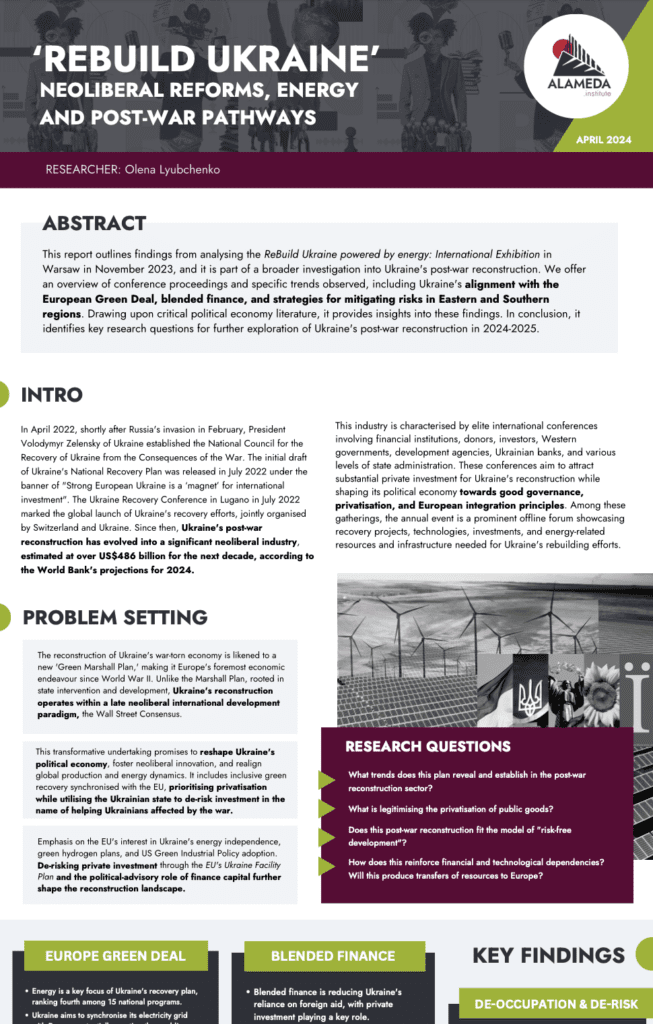Reconstrução da Ucrânia: reformas neoliberais, energia e caminhos pós-guerra
por Olena Lyubchenko
Leia o novo relatório curto de nossa pesquisadora afiliada Olena Lyubchenko que examina as tendências na reconstrução pós-guerra da Ucrânia. O relatório analisa a previsão de novembro de 2023 Exposição ReBuild Ukraine Powered by Energy em Varsóvia, Polônia, e faz parte de uma investigação mais ampla sobre a reconstrução pós-guerra da Ucrânia.

O relatório destaca o alinhamento da Ucrânia com o Acordo Verde Europeu, enfatizando a energia renovável, a independência energética e o desenvolvimento de infraestrutura. Ele também se concentra em atrair investimentos privados por meio de conferências e parcerias com instituições financeiras e governos ocidentais.
- Como a ênfase na privatização afetará os bens públicos?
- O plano cria um ambiente de desenvolvimento realmente “livre de riscos”?
- A reconstrução reforçará as dependências financeiras e tecnológicas?
- Poderiam ocorrer transferências de recursos da Ucrânia para a Europa?
- Como isso afeta o setor humanitário?

Olena Lyubchenko
Olena Lyubchenko é doutoranda em Ciência Política na York University, em Toronto, e membro associado do corpo docente do Brooklyn Institute for Social Research. Sua pesquisa e ensino se baseiam na crítica marxista da economia política e se concentram na reprodução social, na acumulação primitiva e na criação e transformação da União Soviética no contexto global. Escreve sobre a reestruturação neoliberal, a financeirização da reprodução social, a racialização e a cidadania na Rússia e na Ucrânia pós-soviéticas, bem como sobre a regulamentação das relações trabalhistas no Canadá colonial. Olena é editora da LeftEast e da Midnight Sun Magazine. É co-editora do volume Change and Continuity: Canadian Political Economy in the New Millennium (McGill-Queens, 2019).
CONTINUE LENDO
ARTIGOS RELACIONADOS
Soberanos do Brasil
Quem exerce o poder de decisão sobre os rumos do país? ___ Este artigo foi originalmente publicado pela Piauí. 13 de fevereiro de 2026 ___ Com certeza, a execução marcial de Policarpo Quaresma foi apenas a consumação dramática de seu triste fim,...
Estamos agora no estágio Sopranos do imperialismo
fevereiro 3, 2026 Este artigo foi originalmente publicado por Jacobin ___ O ataque à Venezuela marca a chegada do estágio Sopranos do imperialismo: a transformação da hegemonia dos EUA em extorsão pura e simples. Como na máfia, a lealdade pode acabar não comprando nada,...
O ‘Complexo Militar-Digital’ controla tudo?
Este artigo foi publicado originalmente na Tribune. 23 de dezembro de 2025 ___ Considere quatro eventos que capturam vividamente o espírito de nossos tempos. No final de agosto de 2025, na cidade portuária de Tianjin, no norte da China, Xi Jinping, Narendra Modi e Vladimir...
